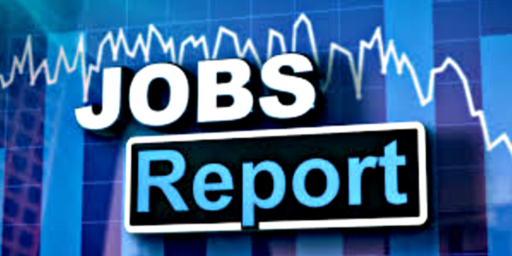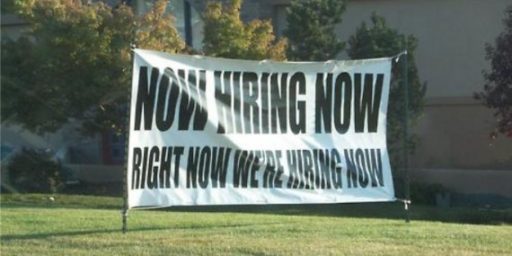November Unemployment Numbers
Basically, not good.
Nonfarm payroll employment fell sharply (-533,000) in November, and the unemployment rate rose from 6.5 to 6.7 percent, the Bureau of Labor Statistics of the U.S. Department of Labor reported today. November’s drop in payroll employment followed declines of 403,000 in September and 320,000 in October, as revised. Job losses were large and widespread across the major industry sectors in November.
This is really bad. Not only is the nonfarm payroll down sharply, but the numbers for October and September have been revised downwards. For October the revision is substantial, 80,000 more jobs lost, and for September 199,000 more jobs lost. Over the three months a over 1,270,000 jobs have been lost.
Both the number of unemployed persons (10.3 million) and the unemployment rate (6.7 percent) continued to increase in November. Since the start of the recession in December 2007, as recently announced by the National Bureau of Economic Research, the number of unemployed persons increased by 2.7 million, and the unemployment rate rose by 1.7 percentage points.





I thought this paragraph from Marginal Revolution was interesting:
My criticism of Economics has been that it isn’t producing an answer to this mess, just continued debate and hobby-horses.
For Tyler to speak of “Democratic Party economist[s]” and “Republican economists” reinforces that a bit.
It would be nice if the discipline, self-described as a science, could produce a little more engineering and a little less of their own internal politics.
The job losses isn’t the only concern. Job creation other than in government, education, health care, and construction has been quite phlegmatic for the last eight years. I doubt that construction will be the engine of the economy for the next several years if ever.
I also doubt that we can build a robust economy based on job growth in government, education, and health care, all of which are dependent on tax dollars. The taxes need to come from somewhere.
Losing the jobs is one thing but losing them for good is even more concerning.
BTW, I could do a few paragraphs on what I like about economics, as an observational tool. It is the hubris and folly in … what is it, macroeconomic prescription? … that is good for a few rotten tomatoes here in December 2008.
Economics is not engineering, this is where you go off the rails.
And in reading both Cowen and Rodrik I can see why Cowen is not happy. Rodrik is treating his economic model as if it is always true and that people, firms, etc. in the economy don’t respond to changes in policy (i.e. he is failing to consider the Lucas Critique of macro-econometric models and macro-economic models in general). That is, if we put a ban on imports in place what are firms going to do? Increase production…or simply increase prices now that they face less competition?
Keep in mind that a firm that sees an increase in its monopoly/price setting power is actually likely to decrease output. This is actually a pretty uncontroversial result of micro-economic theory (which indicates another mistake on the part of guys like Rodrik, they seem to fail to appreciation grounding their models on micro-foundations a problem pointed out about Keynesian models in the 1970’s).
And Odograph is demonstrating ignorance yet again. Macroeconomics is one of the areas of economics that is…not well understood. There are competing models of how the economy works. For example, just off the top of my head here are several “schools of thought”
1. Real business cycle theory
2. New classical
3. New Keynesians
4. Neo Keynesians
5. Monetarists
Each one has its own assumptions about the economy and as a result conclusions about how to stimulate the economy. For example, the New Classical school holds that only non-systematic monetary policy has an impact on the economy.
In looking at the New Keynesian models we have the assumption of “menu costs” that changing prices is costly to firms, hence they only change them intermittently and thus prices are not always set to clear markets. This stickiness in prices (including wages) is what causes monetary policy to be effective.
Now, the issue is…is the current crisis the result of menu costs? Seems unlikely, to me. The narrative supplied by most of the schools of thought for macro theory just don’t seem to fit the current situation. The problem actually fits more with a micro-theory explanation…that we had problems with asymmetric information. That in financial and real estate markets there were issues with moral hazard, adverse selection, hidden information, unverifiability, etc. But that only explains the origin of the problem, it doesn’t provide a nice neat tiddy answer as to what should be done at a macro level to address the problem.
It isn’t that economists don’t want to be able to say, “Pursue policy X, that will work.” It is that there is no unified macro-economic theory like at the micro-economic theory level.
This is your problem Odograph, your expectations are completely and totally unrealistic.
You are so funny, that you like to agree with me and insult me at the same time.
You are agreeing, that after decades of promises that they knew how to “manage” the economy, the economic architects are coming up empty.
You remember “the great moderation”, right?
Maybe your hostility comes from the fact that you think I’m right, and don’t want to agree with me at the same time?
Bernanke speaking:
Steve, this is excellent practice for being told what you really mean vis-a-vis intentionalism and controlling the narrative. I think there will be a lot of that in the coming years.
Really who has made such promises?
Nope. And in reading that long quote I don’t see support for your assertion. Even Bernanke himself points out that the debate is (was) still very much open.
No, I think you are an ignoramus who doesn’t know what he is talking about. On one hand you think the following:
Economists should be more like engineers and come up with a solution. Simple.
Then on the other hand you agree with me that economics is not like engineering and that there is no unifying macro theory on which to base this engineering like approach.
And finally you insist that politics is a non-issue if the magic cure-all could be found by economists. Nevermind all the evidence suggesting the exact opposite…that politicians will use crisis to expand their power. Nope with the cure-all in hand if necessary the politicians will kill thier political careers if necessary and not expand the size and power of government.
You make it sound like, this problem isn’t a political problem as well as economic problem. It is both. And as such, the idea that economics is going to provide valuable insight is limited even if a unified macro theory were present.
Oh…and the great moderation…yeah it was real. Volatility did decline for the period Bernanke mentioned. The issue is why? Was it structural, policy, luck or maybe a combination of all of the above? You seem to be confused between the fact of the Great Moderation and the hypotheses people have put forward to explain it.
Steve, you are a great one for arguing positions I never had or wrote.
Nope, but if conomists offer, or criticize, “engineered” solutions there might be a conflict. If they don’t know the answer, they should pretty much start with that humility in every essay they write.
Never said that.
I never said politics was a non-issue. What I asked was, before you complain about politics make clear your alternative.
You can’t blame it on politicians ignorance of economics when the economists themselves cannot agree.
Again no. I’m saying if you are going to decry politics you should have an alternative.
I will dig up some quotes when I have the time, but it frankly astonishes me that you didn’t hear the same claims that we would not get in this spot again.
Finally, as a bottom line … if you agree with me that economics is not science, and cannot fix this mess, why are you so angry and pompous?
Shouldn’t you be humble about the limits of your discipline?
Here’s the kind of thing I was picking up on, from America.gov
(emphasis mine)
I also seem to remember something about replacing the fed with a notebook computer, monetary policy and money supply being so easy … I can’t google that though … too many notebook computers for sale.